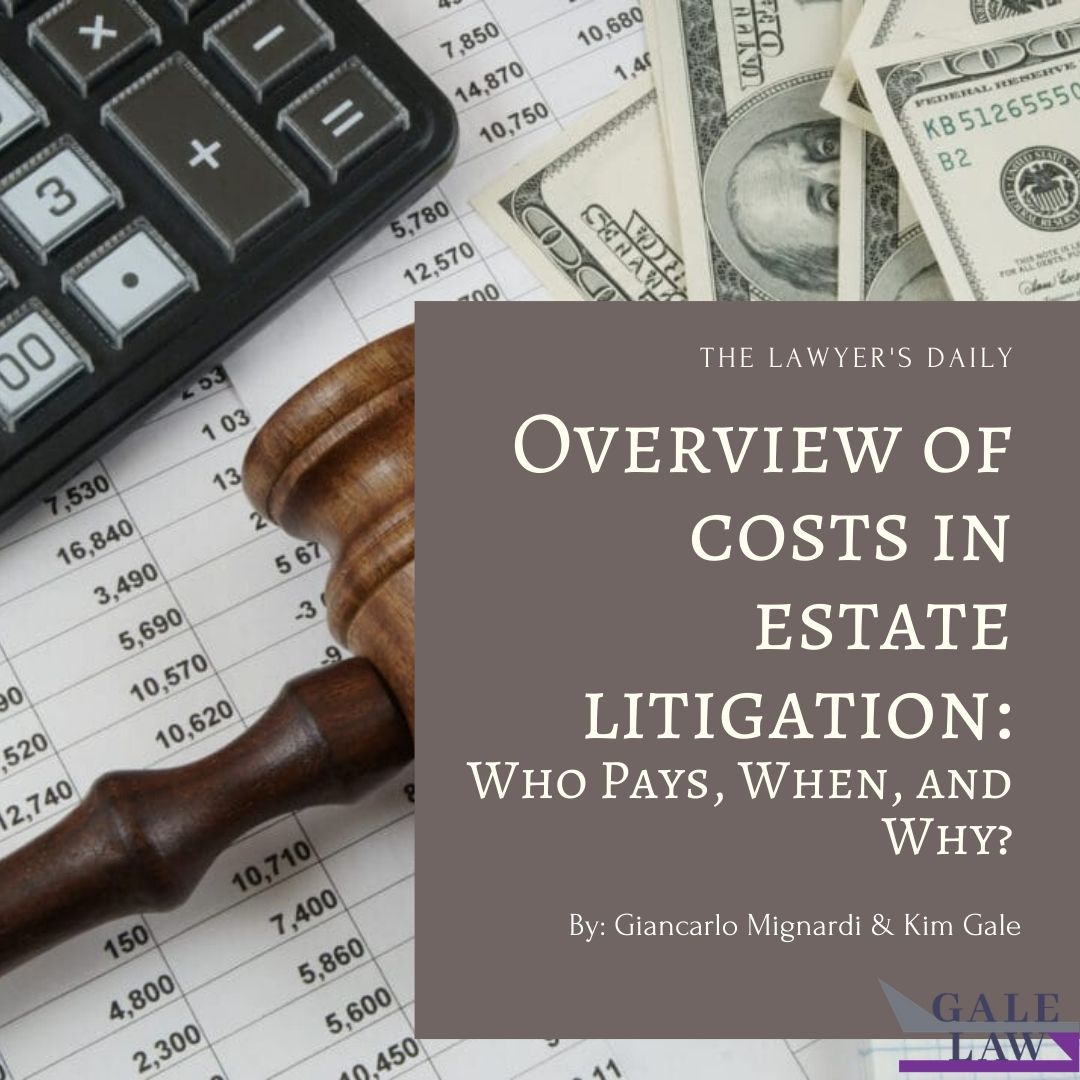
This article was originally published by The Lawyer’s Daily (www.thelawyersdaily.ca), part of LexisNexis Canada Inc.
An Overview of Costs in Estate Litigation: Who Pays, When, and Why?
The issue of which parties are to bear the costs of litigation in estate matters presents some interesting nuances. On the one hand, estate matters are merely civil proceedings and, in such proceedings, costs generally “follow the event”, meaning that courts order them to be paid by the unsuccessful party to the successful party. On the other hand, such matters can present unique questions: What if the testator—because of mistake, neglect, etc.—failed to make his/her intentions clear enough, effectively constraining the parties in an estate matter to, well, bring the matter to court? What if there are concerns about the execution of the will, or the testator’s capacity at the time of execution? One would think that, in such cases, a common-sense approach to costs would acknowledge that, “winning” and “losing” aside, there are times when all parties may have ultimately benefited by having brought the matter to court to resolve issues, and thereafter administering the estate appropriately. Ideally, perhaps it would also acknowledge that the testator was—be it partially or otherwise—at fault himself/herself for not having laid out her intentions with sufficient clarity.
These are precisely the types of considerations that today’s “modern approach” to costs in estate litigation seeks to balance and reconcile, and a brief summary regarding how it does this follows, below. While the general rules regarding the awarding of costs in civil proceedings applies to estate matters, a special approach has been developed in estate litigation that may allow for costs to be borne, not by the parties, but by the estate, in select circumstances.
The “Modern Approach” to Costs in Estate Litigation
As mentioned above, generally, the unsuccessful party bears the costs of the civil proceeding. However, in estate litigation, there can be an exception to this general rule if there is a policy justification to deviate from it. When a policy justification is found, then courts may instead order that the costs of some or all of the parties/proceedings be paid out of the estate. In McDougall Estate v Gooderham, the Ontario Court of Appeal outlined that a departure from the normal principles for determining responsibility for costs is justified in two circumstances: (1) where reasonable grounds exist to question the execution of the will or the testator’ capacity to make the will; or (2) where the difficulties or ambiguities in the will being considered by the court were partly or wholly caused by the testator (e.g. by some sort of failure to lay out her intentions clearly so as to have better avoided the need for future litigation). The Court stated at para 85 of McDougall Estate:
Gone are the days when the costs of all parties are so routinely ordered payable out of the estate that people perceive there is nothing to be lost in pursuing estate litigation.
Essentially, this approach seeks to strike a balance between: (1) the important role that courts must play in ensuring that valid wills are admitted to probate and complexities/ambiguities relating to it are resolved; and (2) the need to effectively control the propensity for parties to bring unwarranted or unreasonable proceedings under a misplaced expectation that the estate will pay for such proceedings.
Courts applying this approach will have an appreciation for the facts. Overly simplistic assessments regarding whether or not the will was challenged, or whether or not the capacity of the testator was put in issue, are not enough to render a conclusion as to whether the estate should bear the costs. A deeper analysis is always required.
Recently, in Trezzi v Trezzi, the Ontario Court of Appeal discussed the proper application of this approach to costs in estate litigation. It reaffirmed that courts in estates matters are to follow the costs rules that apply in civil proceedings, unless one of two “public policy considerations” are applicable: “(1) the need to give effect to valid wills that reflect the intention of competent testators; and (2) the need to ensure that estates are properly administered.” This statement is precisely in line with McDougald Estate.
Partial Indemnity or More?
As in other civil proceedings, courts resolving estates matters have routinely reaffirmed that costs above a partial indemnity scale should only be awarded: (a) when one party has made an offer to settle which the other party has not accepted and the former party obtains a judgment as favourable or more favourable than the offer (i.e. Rule 495 offers); or (b) when the court makes a clear finding of reprehensible conduct on the part of the party against whom the cost award is being made.
Other Costs Potentially Borne by the Estate
Generally, executors incurring costs in the course of estate litigation are entitled to full indemnification for such costs out of the estate. The underlying principle here is that executors are entitled to indemnification for all reasonably incurred costs involved in their administration of the estate. It has often been noted that not allowing for this could otherwise turn people away from accepting appointments as executors, or could make executors reluctant to bring proceedings to advance the due administration of an estate.
Executors may have to bear their own costs if they unreasonably resist a reasonable challenge to the will, and courts may order them to bear their own costs for unnecessary or unwarranted proceedings, as well as for reprehensible conduct during such proceedings. Just like other parties in estate litigation, executors should not be initiating ill-advised litigation under the assumption that the estate will bear their costs.
Concluding Remarks
There are many cases where litigation may be necessary to properly distribute an estate. The modern approach to costs in estate litigation is a principled one that provides an effective means of identifying when this may or may not be the case, and awards costs accordingly.
